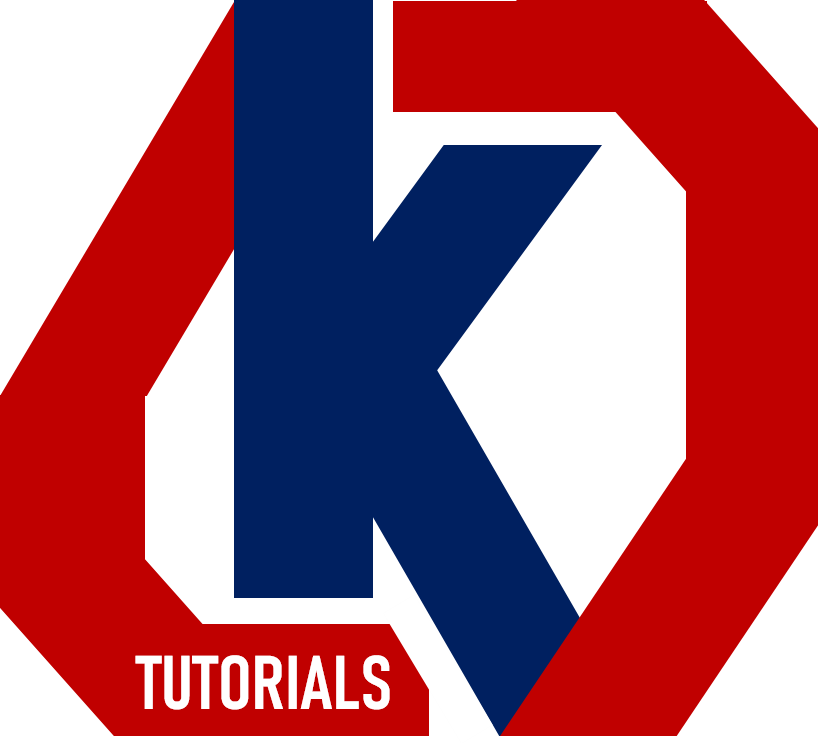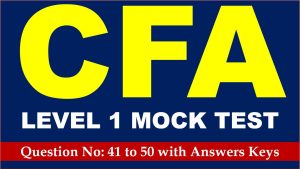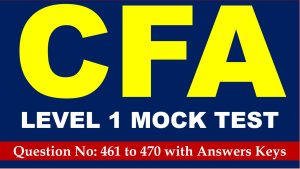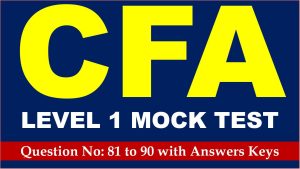Hi CFA Aspirants, welcome to AKVTutorials. Are you preparing for CFA Level 1, 2, 3 exams for making a career in CFA (Charted Financial Analyst). According to CFA Wikipedia, CFA The Chartered Financial Analyst (CFA) program is a postgraduate professional certification offered internationally by the American-based CFA Institute. A candidate who successfully completes the program and meets other professional requirements is awarded the “CFA charter” and becomes a “CFA charter holder”. Therefore, you need CFA Study Notes and Free CFA Level 1 Practice Test 4 Questions Bank Answer Keys AMBIPi
In this article, you will get Free CFA Level 1 Mock Exam Practice Questions.
Free CFA Level 1 Mock Practice Exam Questions Bank
Free CFA Level 1 Practice Question No: 261:
An AIMR member who lives in Atlantis, where some laws are stricter than the AIMR Code of Ethics and others are less strict, should follow:
Option A : Atlantis’ laws, since the member resides in Atlantis.
Option B : A combination of the two which results in a stricter set of laws.
Option C : AIMR code, since the code is a strict set of rules.
Option D : Not clear from the information provided.
Show/Hide Answer
Option B : A combination of the two which results in a stricter set of laws.
A member must always abide by the AIM code (Standard 1), unless the local laws in any given case are stricter, in which case, the stricter standard applies.
CFA Level 1 Exam Question No: 262:
In order to comply with Standard IV (B.4), Priority of Transactions, firms should prepare and distribute to firm personnel a code of ethics and compliance procedures. The code and procedures should do all of the following, EXCEPT:
Option A: establish reporting and prior-clearance requirements.
Option B: ensure that procedures will be enforced.
Option C: consider special situations.
Option D: contain disciplinary procedures.
Option E: define personal transactions, investment and prohibited transactions.
Option F: maximize the number of access persons.
Show/Hide Answer
Option F : maximize the number of access persons.
The question deals with the compliance procedures under Standard IV (B.4). Personal transactions must be defined to all employees. The number of access persons – those who have knowledge of pending or actual recommendations or action – should be limited, by implementing Fire Walls.
Free CFA Level 1 Mock Exam Question No: 263:
Which of the following AIMR Standards states that the financial analyst must use reasonable judgment as to the inclusion of relevant factors in research reports?
Option A: III (C.2).
Option B: I A.
Option C: III D.
Option D: IV (A.2).
Show/Hide Answer
Option D : IV (A.2).
Standard IV (A.2) – Research Reports states: “Members shall use reasonable judgment regarding the inclusion or exclusion of relevant factors in research reports.”
CFA Level 1 Free Practice Question No: 264:
Meriam Mastrani is a senior member of “The Seven Samurai,” a high-flying hedge fund. Meriam supervises a group of 6 portfolio managers and is also involved in advising some independent clients. To prevent violations of securities laws at the firm, Meriam has instituted some standard procedures in conjunction with the Compliance Department. However, for the past 6 months, he has been extremely busy catering to his clients to be able to check on the weekly compliance reports.
Meriam does not have a deputy whom he can delegate his duties to. No violations of any laws have been detected at The Seven Samurai. Meriam has
Option A: has not violated any standard in the AIM code of ethics.
Option B: violated Standard III (B) – Duty to the Employer.
Option C: violated Standard III (E) – Responsibilities of Supervisors.
Option D: none of these answers.
Show/Hide Answer
Option C : violated Standard III (E) – Responsibilities of Supervisors.
Standard III (E) – Responsibilities of Supervisors – requires that supervisors must take reasonable care to ensure that their subordinates do not violate any laws or the code of conduct. This includes designing effective procedures to deter fraudulent activity. However, merely enacting such procedures does not fulfill the member’s duties. If steps are not taken to make sure that the restrictions are being abided by, the member could be deemed in violation of Standard III (E).
By not keeping track of the activities of his subordinates for an extended period of time and not having a deputy to whom such a duty could be delegated, Meriam has violated Standard III (E).
Free CFA Practice Question No: 265:
Brown works for an investment counseling firm. Green, a new client of the firm, is meeting with Browrn for the first time. Green used another counseling firm for financial advice for years, but she has switched her account to Brown’s firm. After a few minutes of get-acquainted talk, Brown explained to Green that she has discovered a highly undervalued stock that offers large potential gains. She recommends that Green purchase the stock. Brown has committed a violation of the Standards. What should she have done differently?
Option A: Brown should have determined Green’s needs, objectives and tolerance for risk before making a recommendation for any type of security.
Option B: Brown should have explained her qualifications, including her education, training, experience and the meaning of the CFA designation.
Option C: Brown should have asked Green her reasons for changing counseling firms. If the discovery process indicated that Green had been treated unfairly at the other firm, Brown should have notified AIMR of any violation.
Option D: Brown should have thoroughly explained the characteristics of the company to Green, including the characteristics of the industry in which the company operates.
Show/Hide Answer
Option A : Brown should have determined Green’s needs, objectives and tolerance for risk before making a recommendation for any type of security.
Brown has provided investment recommendation before making inquiries about the client’s financial situation, investment experience or investment objectives. Brown is thus violating Standard IV (B.2), Portfolio Investment Recommendations and Actions. Why the client changed investment firms is not useful information to provide suitable recommendations. The other answers indicate information members should discuss with their clients at the outset of the relationship, but these answers do not constitute a complete list of those factors.
CFA Level 1 Sample Question No: 266:
Performance Presentation Standards state that subsectors of larger international composites may be used to create stand-alone composites only if the subsectors are managed as __________ entities.
Option A: independent.
Option B: two.
Option C: unique.
Option D: separate.
Show/Hide Answer
Option C :
Subsectors or carve-outs of larger international composites may be used to create stand-alone composites only if the subsectors are managed as separate entities with their own cash allocations and currency management.
Free CFA Level 1 Quiz Question NO: 267:
Standard IV (A.3) relates to two major components and is titled independence and _________.
Option A: objectively.
Option B: none of these answer.
Option C: impartation.
Option D: Autonomy.
Option E: Justice.
Show/Hide Answer
Option A : objectively.
Standard IV (A.3) – Independence and Objectivity, states that members shall use reasonable care and judgment to achieve and maintain independence and objectivity in making investment recommendations or taking investment action.
Free CFA Level 1 Quiz Question NO: 268:
Trisdale is a portfolio manager who has consistently outperformed the market on a risk-adiusted basis for the past 3 years. As an appreciation for his work, one of his clients recently gave him a travel package to Vancouver worth around $5,000. Trisdale informed his supervisor about this gift and then took time off from work to enjoy a vacation in Vancouver. Trisdale has
Option A: violated Standard III (D) – Disclosure of Additional Compensation Arrangements.
Option B: violated Standard IV (A.3) – Independence and Objectivity.
Option C: not violated the AIMR code of ethics.
Option D: violated Standard IV (B.3) – Fair Dealing.
Show/Hide Answer
Option C : not violated the AIMR code of ethics.
The AIM code of ethics does not preclude members from accepting gifts in excess of the modest amount of $100 from clients, as long as they are disclosed to the immediate supervisor. What the code does prohibit is acceptance of gifts in excess of $100 from parties that have a strong motive to influence the judgment of the members (e.g., companies that a member might be researching for investment recommendations. The disclosure of additional compensation arrangements with clients allows the supervisory authorities to monitor the portfolio activity and ensure that the gift-giving client’s portfolio is not receiving any undue, favorable treatment.
Free CFA Practice Question No: 269:
Currency overlay portfolios must be valued at least ________.
Option A: monthly.
Option B: yearly.
Option C: quarterly.
Option D: hourly.
Option E: daily.
Show/Hide Answer
Option C : quarterly.
In accordance with the AIMR-PPS, currency overlay portfolios must be valued at least quarterly, but because of the volatile nature of these portfolios, firms may need to revalue currency overlay portfolios more frequently than quarterly to obtain full al fair disclosure.
CFA Mock Exam Free Question No: 270:
Standard III (A) deals with _________.
Option A: None of these answers.
Option B: Obligation to Inform Employer of Code and Standard.
Option C: Professional Misconduct.
Option D: Use of Professional Designation.
Option E: Plagiarism.
Option H: Duty to Employer.
Option G: Disclosure of Conflicts to Employer.
Option H: Fundamental Responsibilities.
Show/Hide Answer
Option B : Obligation to Inform Employer of Code and Standard
Standard I deals with Fundamental Responsibilities. Standard I
(A) deals with Use of Professional Designation. Standard II (B) deals with Professional Misconduct. Standard II (C) deals with Plagiarism. Standard III (A) deals with the Obligation to Inform Employer of Codes and Standards. Standard III (B) deals with the Duty to Employer. Standard III (C) deals with Disclosure of Conflicts to Employer.



